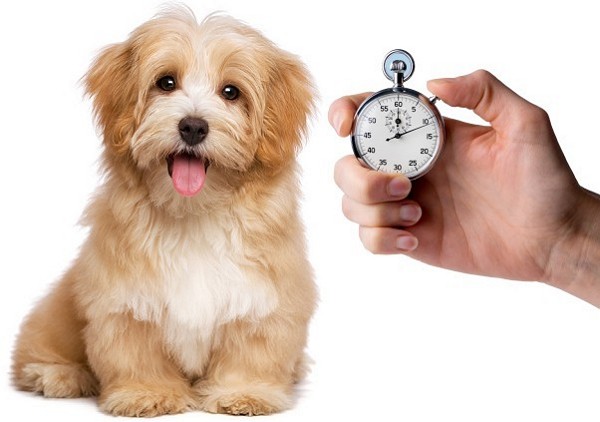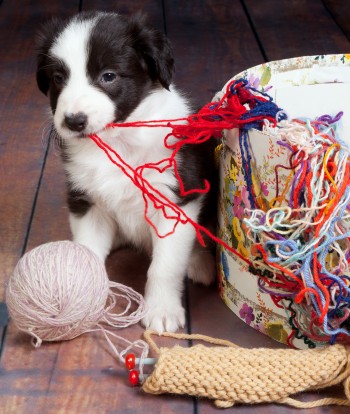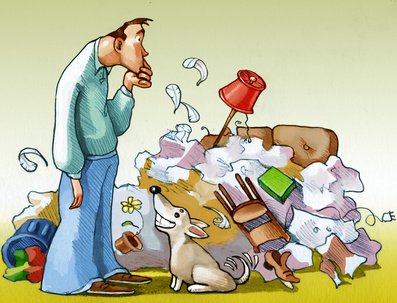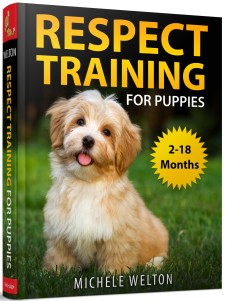Respect Training For Puppies: 30 Seconds to a Calm, Polite, Well-Behaved Puppy (FREE BOOK)
By Michele Welton, Dog Trainer, Breed Selection Consultant, Author of 15 Dog Books
30 seconds to a calm, polite, well-behaved puppy? Really?
Yes, 30 seconds. Bear with me for a moment, and I'll explain. :)

30 seconds.... the clock is ticking.... what is your pup learning right now?
Some people think that obedience training is the key to making a puppy well-behaved.
They hope that by taking their puppy to a one-hour obedience class each week, and then practicing the commands for another hour each night, their pup will be well-behaved.
But the truth is that very little obedience training needs to be done with a puppy to get him to be well-behaved.
That's right. Very little obedience training.
Keep in mind that I've instructed obedience classes for over 35 years, so I certainly wouldn't say that unless it was true.
The truth is that what a puppy needs most is to be lived with properly. Living with a puppy properly includes some obedience training, yes. But teaching obedience commands like "Sit" or "Stay" only influences about 20% of the way your puppy ends up behaving.
On the other hand, how you live with the puppy around the house on a daily basis influences 80% of his behavior.
And that's where the 30 seconds to a calm, polite, well-behaved puppy comes in!
Puppy training is really about Teachable Moments – very short moments – all through the day

For this behavior, you'll want to give Puppy a thumbs-down....
You train your puppy in quick moments throughout the day as he tries out various behaviors and you give either a thumbs-up or a thumbs-down.
- Those quick interactions around the house, outside in the yard, feeding and grooming and taking your puppy for a walk, determine how your puppy will turn out.
- Those quick interactions are how your puppy learns how high (or low) your expectations are, and whether your rules carry any weight or you're just blowing smoke.
- Those quick interactions are how you mold your puppy into a calm, polite, well-behaved dog.... or an excitable, disrespectful, misbehaving dog.
Those quick interactions take only 30 seconds.
Often far less than 30 seconds.
A perfect example from my own family....
One of my current dogs is a Poodle; another is a Chihuahua. The Poodle is very smart and learns quickly – she knows about a hundred commands. The Chihuahua is not very smart and learns more slowly – she knows six commands.
Yet both dogs are equally housebroken, equally attentive and obedient, equally calm and well-behaved, equally trustworthy with other people and other animals.
Because they were both raised right, you see. When they were puppies, I used every 30 second opportunity I could spare....
- To show them what they should be doing from the moment they woke up in the morning to the moment they went to sleep at night. I filled their days with predictable routines so they learned exactly how I expected them to live with me.
Whether they were eating a meal, getting brushed, going out to potty, playing a game with me, or going for a walk – I had a routine for everything. Predictable structure is so important to dogs!
- I set firm boundaries that certain behaviors were not allowed. Dogs want to know what they should do, but also what they shouldn't do.
- And I established the right human-canine relationship in which I was the calm, confident, trusted leader and they were the relaxed, secure followers.
If you do just those three things with your puppy, you'll have very few problems with him. Even if he knows only a few obedience commands, he'll turn into a great adult dog.
On the other hand, so many people take their puppy to a year's worth of obedience classes, only to become frustrated because he is still chewing things, jumping on people, pulling on the leash, and barking.
That's because in obedience class, owners are not taught how to interact with their puppy around the house every day. And it's those daily interactions that make or break how your puppy turns out.
Puppies learn things every minute they're awake
Puppies learn all the time. You can't stop them from learning things.
Every time you do something with your puppy, he learns something about you. Every time he tries a behavior, he learns something from your reaction.... or your non-reaction.
The question is, WHAT is your pup learning?
Here are some examples of common behaviors that puppies learn from your reaction or non-reaction:
- "Barking gets me out of my crate."
- "Whining pitifully makes people give me things from their dinner plate."
- "The kids keep chewable action toys in their bedrooms."
- "The bathroom wastebasket includes used tissues I can shred and swallow."
- "The laundry room is full of smelly underwear I can chew on."

"Hi! I'm done fixing your living room! Can I have a go at the master bedroom next?"
- "The stuffing comes out of cushions so easily!"
- "Jumping on people makes them pet me."
- "If I don't want to give up my toy, I can clamp down on it with my teeth and hold on."
- "Chomping on people's fingers is great fun."
- "I can run away from people pretty fast!"
- "When people reach toward my collar, I can dodge them for quite some time!"
- "Pushing my head into someone's lap makes them pet me."
- "Pulling on the leash makes people follow wherever I want to go."
- "If I don't want my nails clipped or my teeth brushed, I can make it stop by squirming and struggling."
Puppies learn things even while you're sleeping!
Say you're asleep and your pup is wandering around the house. He finds the bowl of potato chips you left on the coffee table, within easy reach of his paws.
Did you just teach him something? Heck, yes! You taught him that nighttime is not a time to sleep, but to search for food.
You taught him that food is fair game if he can reach it. You taught him that you can't correct him when you're not present.
See how much you taught him, in 30 seconds, while you were sleeping?
In all my years of experience as an obedience instructor, competitive trainer, and canine behavioral consultant, I can assure you that dog training is much less about the teaching of commands.... and much more about how you live with your dog.
Virtually ALL puppy behaviors (good and bad) are created by the way you live with your puppy.
What you do with your pup.... what you don't do with your pup.... what you allow him to do....these are all messages to your puppy.
He soaks those messages up like a sponge, and THAT is what dictates how he will behave in your family. Not a bunch of obedience commands.
Send the right messages and you will have no problems with your pup. Send the wrong messages and you will have problems. It's that simple.
So if you have a puppy between 2 and 18 months old (yes, most 18-month-olds are still puppies), you should start immediately managing his daily life in your household so that he learns:
- that "these" are the behaviors you expect him to do
- that "those" are the behaviors you won't allow him to do
- and that you are in charge of deciding which behaviors he must (and mustn't) do

This entire book is free... just keep reading this page.
Respect Training for Puppies: 30 Seconds to a Calm, Polite, Well-Behaved Puppy is the only training program you will ever need for raising your puppy.... and I've put the entire book online for free. Keep reading...
I will show you which behaviors you should expect your puppy to do – and how to teach those behaviors and make sure that he does them.... every time.
I'll show you which behaviors you should stop your puppy from doing – and how to stop him.
And I'll show you how to communicate to your puppy that you are in charge of everything. Puppies love this because then they don't have to be responsible for constant decision making.
You'll learn how to teach your puppy exactly what he must and mustn't do, in quick teachable moments throughout the day. 30 seconds here, 30 seconds there, whenever and wherever those opportunities pop up.
Without further ado, here is the complete training program from my book, Respect Training for Puppies
Chapter 1: Good news! If you've read everything on this page up to this point, you've just read Chapter 1 ![]()
Chapter 2: True or false... all a dog needs is love?
Chapter 3: Do these 3 things and your pup's behavior will be (nearly) perfect
Chapter 4: 23 steps to perfect puppy manners (how to use routines, consequences, and leadership in daily living)
Chapter 5: Corrections: Teaching "No"
Chapter 6: Seven mistakes to avoid when teaching "No"
Chapter 7: All family members should be on the same page
Chapter 8: Praise and Rewards: Teaching "Yes!" or "Good!"
Chapter 9: Calmness indoors is essential
Chapter 10: Introducing your puppy to the leash
Chapter 11: Walk nicely on leash
Chapter 12: Go for a structured walk
Chapter 13: Go into your crate and stay quietly
Chapter 14: Stay quietly in an exercise pen
Chapter 15: "Wait" for permission before going through doors or gates
Chapter 16: "Go to your bed"
Chapter 17: Your puppy should look at you when you say his name
Chapter 18: Come when called
Chapter 19: Take things gently from your hand
Chapter 20: Take charge of your puppy's food
Chapter 21: Take charge of where your pup naps and sleeps
Chapter 22: Stop over-dependency and demanding behaviors
Chapter 23: Stop mouthing/biting of your hands
Chapter 24: Stop barking
Chapter 25: Stop jumping on people
Chapter 26: Take charge of the doorbell
Chapter 27: Make your pup move
Chapter 28: "Leave it"
Chapter 29: Take charge of the toys
Chapter 30: Games to play (and not play) with your puppy
Chapter 31: Sit and stay
Chapter 32: Your pup should accept handling of every part of his body
Chapter 33: Your pup should "Give" or "Drop" whatever is in his mouth when told
Chapter 34: Housebreaking – basics
Chapter 35: Housebreaking – go to the bathroom outdoors
Chapter 36: Housebreaking – using a doggy door
Chapter 37: Housebreaking – indoor potty yard or litter box
Chapter 38: Housebreaking – cleaning up accidents
Chapter 39: Housebreaking – problems
Chapter 40: Housebreaking – when to give more freedom in the house
Chapter 41: Urinating when excited or nervous
Chapter 42: Marking – leg-lifting against objects
Chapter 43: Interact politely with (or ignore) strangers and other dogs
Chapter 44: Unwarranted aggression is totally unacceptable
Chapter 45: Interact politely with (or ignore) any children/grandchildren in the family
Chapter 46: Be respectful of other dogs in the family – no bickering, pestering, pushiness, or jealousy
Chapter 47: Be respectful of any cats in the family
Chapter 48: Was your rescue dog abused?

German Shepherd, Puggle, Sheltie, Labrador Retriever, Beagle, Bernese Mtn Dog, Dachshund.... Respect Training teaches every puppy of every breed to be calm, polite, and well-behaved.

